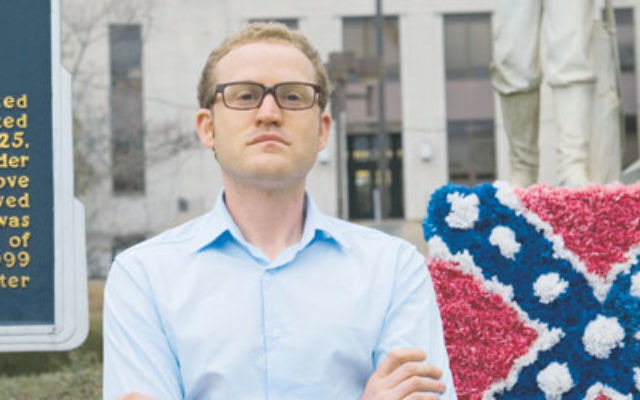Safran’s ‘Truman Capote moment’
IT wasn’t long after John Safran, documentarian, TV star, radio host and all round agent provocateur pulled a prank on a notorious white supremacist in Mississippi for his 2009 ABC documentary series Race Relations, that he was rubbing shoulders with the supremacist’s murderer – a black Mississippian.
On his return to Australia after filming the controversial series, news broke that white supremacist Richard Barrett had been stabbed by his African American gardener, Vincent McGee.
The story seemed an enticing twist on the old Deep South hate crime dynamic, more Django Unchained than Mississippi Burning. Add to that the mystery surrounding McGee’s motives. Was it revenge, money or even passion?
Spotting his “Truman Capote moment”, as Safran puts it, the author left his Carlisle street home in Balaclava, and jumped on a plane bound for the bone dry fields and dusty roads of Mississippi, where he would uncover the murder in his first-ever true crime story, Murder in Mississippi.
In a phone interview with The AJN, the first-time author admitted his book writing process was tougher than expected.
“It was confusing. All of these things happened in the real world and I didn’t know how they were going to fit into the book. I was desperately trying to capture everything on tape and notes. I thought all my phone calls with the killer, Vincent, weren’t really going to be in the book. I thought I would go to the prison to meet the killer, or later on there would be the trial, but none of it ended up working out that way.
“I realised people who write nonfiction with great clarity are probably bullshitting a bit. I investigated this thing and everything was so tangled and confusing and everyone I spoke to had a slightly different story about the same event. I find it hard to believe that this was the first time that happened. So when you read a nonfiction book and the author is writing with a lot of clarity about what happened, I reckon they have made an artistic decision to make it really clear.”
Safran’s investigation sent him on a wild goose chase through hot Mississippi, leading him to a racist, anti-Semitic shock jock and rival supremacist of the late Barrett; the family of the killer and the lawyers on both sides of the criminal case.
Meanwhile, hints of Safran’s Jewish roots are smattered throughout the book. He presents himself as a perpetual outsider no matter where he is – a sneezy Australian Jew in Mississippi or an unpopular Jew in the heart of Balaclava.
The former Yeshivah College student describes in painstaking detail the backlash he drew from within the Jewish community after the controversial Race Relations was screened.
In the first episode of the series Safran donates sperm at a Palestinian sperm bank; he takes a shovel and a kabbalah prayer book to his mother’s grave to discover what she would think of him if he married a non-Jew and he mock-gasses Holocaust denier David Irving.
In Murder in Mississippi he writes that the afternoon before the episode aired he stocked up on food from Coles so he wouldn’t have to leave his flat.
“Months ago I gave up walking down the street. If I need to catch up for coffee, I catch up somewhere else,” he writes, later adding: “as well as race and money and sex and death, this thing [Murder in Mississippi] is about small towns and old ways”.
At one point, Safran cites Harold Schechter, editor of True Crime: An American Anthology to explain the notion that true crime stories are as much about the time and place where the crimes take place as the crimes themselves: “An author tells the story of how the world works, and that’s why we read true crime books,” he writes.
Safran told The AJN that despite the obvious themes of race, he couldn’t help but see the killer’s motivations as a result of family dysfunction.
“I reckon it started off as a race issue in my head, just like everyone who heard about the case. Everyone was very excited about it. The local media, the black activists, but as it went on it wasn’t just that – it had a sense of it being other things too. It was a race issue in so much as Vincent was poor and that poverty was tied into race in Mississippi and Richard was an exploiter and could get away with that more because of the race issue in Mississippi.
“But in my world, I am much more into personal stories. You could have written this book and really framed it as more to do with race, but for me it ended up being about family, really. I kept on thinking what would be different if Vincent’s father was there and his mother … because of my personal biases it was far more about families as it was about race. “I reckon if Vincent was brought up on Carlisle street by my grandparents and then a bit in North Balwyn … he might not have ended up being a murderer.”
Murder in Mississippi by John Safran is published by Penguin Hamish Hamilton. $29.99 rrp.
REPORT by Timna Jacks
PHOTO of John Safran. Photo: Germain McMicking


comments